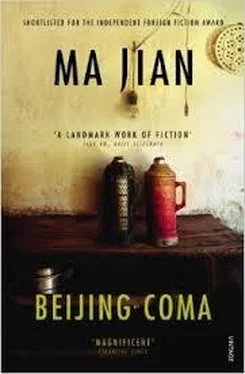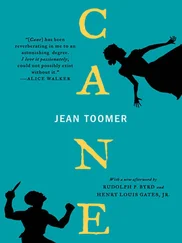At last, the tractor’s noisy diesel engine is turned off. We’ve arrived. Someone is flashing a torch on my face.
‘Say “Hello Auntie”!’ says Dai Dongsheng to a child who is panting beside him. I presume it’s his daughter, Taotao.
‘Don’t worry, it’s late now,’ my mother says breathlessly. ‘She can say it tomorrow.’
A shrill voice shouts out, ‘I’ll take my case to the emperor! A murder must be avenged…’ This must be Dongsheng’s wife.
When she and Dongsheng visited us in Beijing during her illegal second pregnancy, my mother was unable to find a hospital willing to help deliver the child. The police tracked her down after a few days and sent her back to Dezhou, where her belly was opened and her baby boy was drowned before her eyes. The loss of the child drove her insane.
‘Can she look after herself?’ my mother asks, sounding a little ashamed. After they left Beijing, my mother cut out a newspaper article on the social benefits of the one-child policy and sent it to Dongsheng, telling him to persuade his wife to have the child in a government clinic, then pay the fine. She never dreamed that the family planning officers would order the child to be killed. When the couple had told us stories of forced abortions and infanticides, my mother had assumed they were making them up. Dongsheng sold a tricycle cart, five pigs, a wardrobe and a television to pay for psychological treatment for his wife, but no one was able to cure her condition.
‘She makes about fifty brooms a day, which pays for our rice and oil. But she still keeps flinging things out of the house. Look, she’s torn everything off the walls. It’s not easy living with someone who’s lost their mind. She’s even more unstable than my father was.’ Then he adds, ‘Have you remembered to bring the crackdown certificate saying that Dai Wei wasn’t involved in the counter-revolutionary riots? You’ll need to show it to the clinic before they’ll agree to treat him.’
‘Yes, I paid someone to forge one for me. It’s valid for two years.’
‘I didn’t realise he was in such a bad way. Can’t he speak at all?’
‘In your letter you said that this Dr Ma can bring the dead back to life, and make paralysed people walk again,’ my mother says, not bothering to answer him.
‘Yes, he’s very famous around here. Two years ago, he was a full-time teacher at our village primary school, and only treated a few patients in his spare time. But after the niece of the county Party secretary started taking his herbal medicine, his name began appearing in all the newspapers. He made lots of money, and was able to open a private clinic just down the road. He has an official car to chauffeur him now. Anyway, I’ve set it all up with him. Dai Wei can check into the clinic tomorrow morning.’
‘If he could get Dai Wei to open his eyes or stand up, that would be wonderful. Here are some cigarette cartons for you to give as backhanders. And I’ve got some more things for you in this bag.’ My mother lifts the bag onto her lap and opens the zip. I can tell that Dongsheng, his daughter and his wife are all staring at the bag now.
‘We’re family,’ Dongsheng mumbles. ‘There’s no need for you to give us presents.’
‘I’ve brought some dresses and jumpers for you.’ Now I know why my mother spent so long rifling through the wardrobe last night. She has lots of clothes. Most of them are gifts I brought back for her from Guangzhou.
The wife doesn’t take the clothes that my mother offers her. She stays rooted to the ground, muttering, ‘I will take my case to the emperor! A murder must be avenged…’
‘These leather shoes are from America,’ my mother says. ‘Try them on.’ She hands Dai Dongsheng the shoes that were too small for my brother. They should be as good as new. He only wore them once.
‘We make do with rubber-soled shoes in the countryside. These look like something a cadre would own. People will laugh at me if I wear them.’ But despite the protestations, he tries them on. ‘They’re great!’ he says. ‘A perfect fit. I can wear them when I go into town to do business. I’ll look like an official.’ I can tell from his voice that he’s very pleased with them.
‘And this alarm clock is for you,’ my mother continues, turning I presume to their daughter. ‘What’s your name again? My memory’s getting so bad.’
‘She’s called Taotao,’ Dongsheng says. ‘Quickly, say “Thank you, Auntie”! Now go and put the kettle on. Fill it right to the top… She’s the opposite of her mother, that child. She doesn’t say a word.’
‘How much did the tractor you collected us in cost to hire?’
‘Twelve yuan.’
‘Well, here’s a hundred. You can keep the change. It’s spring. I’m sure there’s machinery or seeds you’ll have to buy.’
‘There’s no need for this. We’re family, after all. You’ve got Dai Wei to look after. It’s not as if you’re well off.’
‘Things aren’t easy for us, but we’re still better off than you are out here in the countryside. Go on, take it.’
‘I will take my case to the emperor! A murder must be avenged…’
Alone on your wooden ark, you drift along the endless stream of lymph fluids, continuing your wretched journey.
While Wang Fei and I were playing ping-pong, we heard Han Dan’s voice blaring through the students’ loudspeakers: ‘I’ve resigned from the Organising Committee. I plan to organise a hunger strike and intensify our protests…’
We put down our ping-pong bats. It was getting too dark to play.
‘He’s right to call for a hunger strike now,’ Wang Fei said, wiping his sweaty hands on his trousers as we walked back to our dorm block. ‘But I’m not going to jump on his bandwagon. I proposed a strike weeks ago, when the movement first started. Now he’s making out it’s all his idea.’
When we reached Shu Tong’s dorm, I said, ‘I hope Han Dan and Old Fu’s resignations won’t destroy the Organising Committee.’
‘Han Dan is too impulsive,’ Shu Tong said. ‘I don’t trust him. He wants to use the strike to boost his authority.’ His expression had relaxed since Han Dan had left the dorm.
Old Fu was about to interview the dissident novelist Zheng He, the most celebrated member of the Creative Writing Programme. We’d worked together in the now-defunct supervisory office. He was a serious-looking man with a balding head and thick glasses. One of his books had been made into a low-budget art film.
We filed out into the crowded corridor to leave them in peace.
‘The students are getting very worked up about Han Dan’s speech,’ Sister Gao said, striding up to us. ‘The boycott was a good idea, but who knows what a hunger strike could lead to?’
‘If we launch a strike, the government will crush us, and there’ll be chaos and bloodshed,’ Shu Tong said, pacing nervously up and down the corridor.
‘I agree,’ Liu Gang said. ‘As the executive chairman, I’d like to broadcast an announcement stating that the Organising Committee is opposed to the strike.’
‘There’s no reason why we shouldn’t push for a dialogue and stage a hunger strike at the same time,’ Wang Fei said, puffing on his cigarette. ‘Perhaps if we attack the government from both sides, it will be forced to compromise. The question is: will Han Dan cooperate with us?’
Nuwa went to stand beside him. She’d changed into a short skirt. Her pale legs glowed in the smoky darkness of the corridor. She pulled the cigarette from Wang Fei’s lips and took a quick puff. I couldn’t understand how she could bear to stand so close to him. The stench of his sweat filled the corridor.
Bai Ling poked her head out from my dorm and said, ‘Shu Tong, I think the Dialogue Delegation’s petition needs to be rewritten. It’s too long-winded.’
Читать дальше












